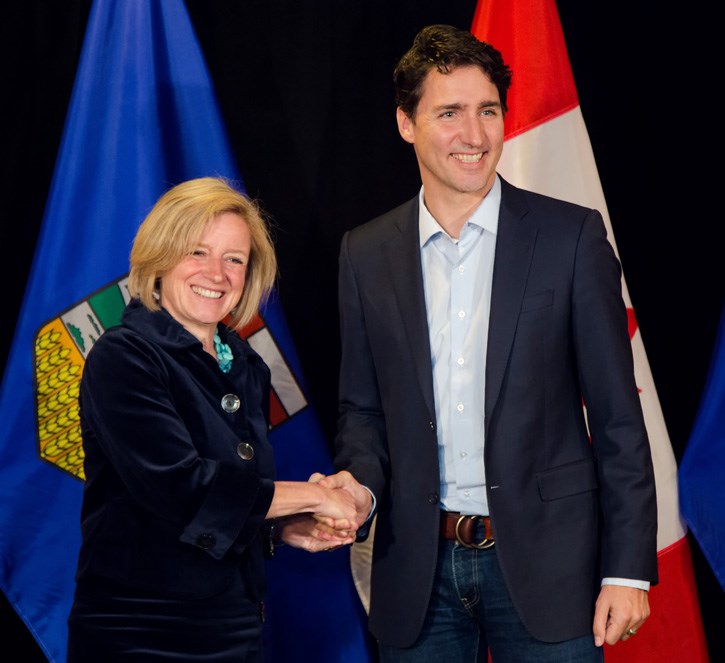CANMORE – Albertans have been locked into a year-long election campaign and as the province gets closer to a spring 2019 vote, it is increasingly clear there are only two parties worth paying attention to.
That’s according to Mount Royal University political science professor Duane Bratt, who spoke at the recent Bow Valley Builders and Developers Association luncheon and painted a picture of the province’s political landscape.
Bratt said the 2019 provincial election campaign has been underway for several months, specifically since Jason Kenney was elected leader of the brand new United Conservative Party.
“We have been going for a year and we still have eight months to go,” he said. “This is an American style election with an 18-month campaign … that is very unusual (for Alberta).”
Prior to the NDP and its leader Rachel Notley winning the 2015 election, the Progressive Conservative Party in the province enjoyed a 44-year run in office. While there may have been some campaigns that were hotly contested – 1993’s race between Ralph Klein and Lawrence Decore, for example – Bratt said Albertans have not seen a campaign focused on two parties with strong leaders since the 1930s.
“We have two very powerful leaders going head-to-head and this is quite uncommon,” he said. “We have an incumbent premier who has been there for four years and a decade-long senior federal cabinet minister going head-to-head.
“The last time we had this stark ideological choice was 1935, so this is a very interesting campaign to say the least.”
Bratt detailed several factors and political strategies that have been at play already leading into a spring election. They include the lingering effects of a recession, deficit spending, unemployment and pipelines.
While Notley has tied her political fortunes to the Liberal government of Prime Minister Justin Trudeau, said Bratt, Kenney has continued to attack the federal level, which he said plays well in Alberta politics.
There are also brand new rules around election financing at play, which prohibit corporate and union donations, while at the same time limit individual contributions.
Bratt was part of a focused in-depth analysis of Albertans’ political leanings earlier this year with the CBC and he said the results of that work show a clear advantage for the UCP and Kenney. He said if an election were to be held today, the right-wing party would not only win, it would have a landslide victory.
But, with several months still to go, and the political landscape easily changed, Bratt said the most important factor for each of the two dominant parties is going to be the ballot box question.
“If the ballot question is about the climate strategy, carbon tax and coal phase out, government debt and pipelines, minimum wage increases or farm bills, we are looking at a brand new government in 2019,” he said.
“If this is about the economy, and most elections are about the economy, you are looking at a change in government.”
The message gleaned from public opinion polling was not very good for the NDP, said Bratt, with the UCP leading not only on the economy, but also on health care and education.
The biggest challenge to Notley’s campaign, he said, is the recent court decision on the Trans Mountain Pipeline. Bratt said Notley tied her government’s success to the pipeline being built, and were unprepared for the decision to go the other way.
“She is going to be punished for this court decision because she has tied herself to this decision,” he said, adding the defeat had nothing to do with any political decision making.
“Finally, there is the link with the carbon tax. There are lots of reasons, or lots of non reasons, to have a carbon tax … but the focus when she announced the policy in the fall of 2016 and going forward was about the social licence to build pipelines and she made that direct link.”
Bratt said Albertans have paid the carbon tax for two years, expecting it to lead to a pipeline and the failure to see that result is politically damaging to the NDP government. He added Notley was correct when she went on live TV after the pipeline decision and called it a crisis.
“Over 8,000 workers quickly lost their jobs as a result of that decision, let alone the impact downstream and upstream,” he said. “We are a land-locked province with one customer that charges us a discounted rate … and forget about the fact this will create a chill on investment not just in Alberta, but across Canada, both domestic and foreign. It is a crisis for Canada and the Notley government.”
Bratt said there are not very many options for Notley and the NDP when it comes to a provincial election campaign that could be successful for them, even if they run a negative campaign against Kenney and the UCP on social issues.
He also downplayed the ability of the provincial Liberals or the centrist Alberta Party led by former Edmonton mayor Stephen Mandel to capitalize on the current political landscape on election day.
“We are in the tsunami of the 2019 election and with such an ideological clash, with such strong leaders, I think we are at least an election away or longer before we see a third party emerge and split the difference,” he said.
“I think both the Alberta Party and the Liberal Party have some serious internal challenges of their own and I do not know if they will even be able to field candidates across the province.”
As for the Banff-Kananaskis riding – nomination processes are currently underway for both the UCP and Alberta Party, while incumbent NDP MLA Cam Westhead has confirmed his re-election campaign.




